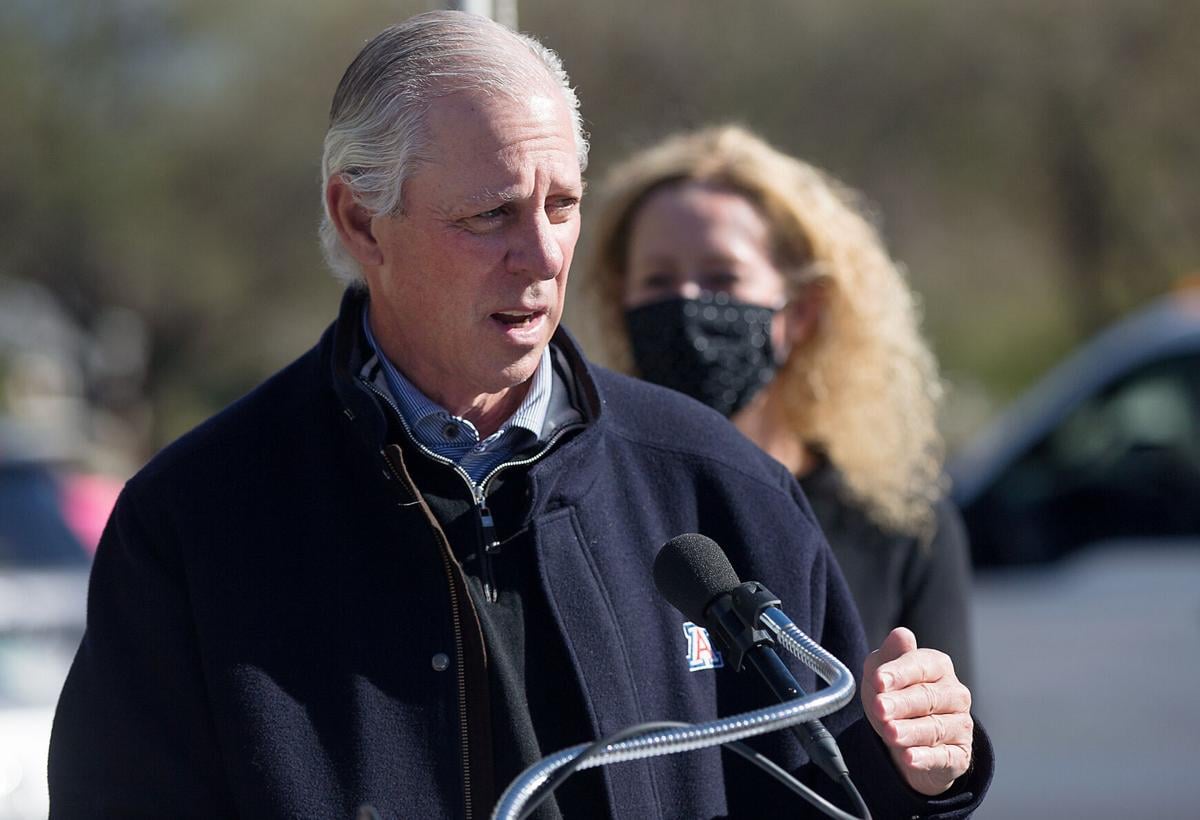PHOENIX — Gov. Doug Ducey has no immediate plans for how — or even if — he will try to sanction the three state universities who are requiring faculty and staff to be vaccinated despite his orders to the contrary.
And he may lack any real power or leverage to do anything about it.
“We are reviewing their decisions,” said gubernatorial press aide C.J. Karamargin.
All this comes as University of Arizona President Robert Robbins on Monday underlined that it is not about to surrender hundreds of millions of dollars in federal grants and other funds to comply with Ducey’s directive.
Robbins, at a weekly media briefing, clearly sought not to pick a fight with the governor.
He said Ducey understands the importance of vaccination. And that, Robbins said, is shown by the fact that the governor himself has been vaccinated and that his health department set up point-of-delivery sites to make the process easier.
But the UA president said he has to consider the fiscal realities of what would happen if the school were to ignore the directive of the Biden administration that any entity must require staff to be vaccinated against COVID if it expects to continue to receive federal dollars.
“It came down to the cold, hard facts we have hundreds and hundreds of millions of dollars of federally supported research programs, educational programs, student employment programs,” Robbins said.
“To say that we’re not going to comply with that presidential order just seemed hopeless,” he continued. “And, so, everyone understood that we had to do this.”
Karamargin said Ducey, while believing the COVID vaccine is effective and safe, remains opposed to mandates.
“Getting the vaccine should be a matter of personal choice,” he said.
But the reality is it would appear that the governor has limited power to impose his will on the universities.
Only the Arizona Board of Regents can fire the university presidents. But, to date, the board has not objected. It has put out a statement explaining the decisions.
It appears that Biden and the feds have the bigger hammer.
Figures from legislative budget staffers show that all three universities collected $998.7 million this past year in federal funds — the very funds that the Biden administration has threatened to withhold from universities that do not have vaccination requirements. By contrast, the state is providing $719.1 million in aid.
That includes $324.7 million at Arizona State University, $109.8 million at Northern Arizona University, and $284.6 million for the University of Arizona, including $207.7 million for the main campus with the balance for the health sciences center.
And Ducey’s leverage actually is decreasing.
In the 2014-school year, the last budget adopted under Gov. Jan Brewer, per-student state aid was $5,194. That figure had slid to $3,767 by the just-completed school year.
“It was pretty straightforward for us,” Robbins said Monday. “We want to keep the support for our research infrastructure and our educational employment opportunities for our students intact.”
But Robbins was not apologetic about making the decision on a financial basis to mandate that the 1,600 employees, including students working for the school, roll up their sleeves.
“I think it’s the right thing that everybody get vaccinated,” he said.
Still, Robbins conceded that there are those who question why he waited until there were dollars at stake rather than simply pursue a vaccine mandate based on public health.
“It’s a fair thing to say that we should have mandated (vaccines) way back, like the University of California system,” he said. It put a policy in place this past summer that covers not just staff and faculty but also students.
“We don’t live in California,” Robbins continued.
“We live in Arizona,” he said. “And we’ve been trying to follow the law and stick with that.”
Anyway, Robbins, who is a cardiothoracic surgeon, said the university has done “pretty well” in controlling the spread so far without any mandates.
“We’ve had good response to people getting vaccinated,” he said.
How many, however, remains to be seen.
As of last Friday when Robbins first made the announcement about the mandate more than half of staff and students already had uploaded their vaccine status to university officials.
“My sense is there’s another percentage that just hasn’t taken the time to upload their vaccination records,” he said. Robbins said the announcement should spur them to do it by the Dec. 8 deadline.
Next, he said, will be those seeking an exemption, either through the university’s disabilities resource center to claim a disability or medical-related exemption, or through the human resources office for those seeking a religious exemption.
“We’ll go down and we’ll take those case by case,” Robbins said. Still, he said, there will be those “very, very few” who will be denied an exemption.
What happens to them is not clear.
“Then we’ve got to look to the federal government to give us guidance,” he said.
“They put this rule on it,” Robbins said. “But, as I understand it, they haven’t given us firm guidance about what happens if there is that rare individual who chooses not to get a vaccine and does not get an exemption.”
At this point, students who do not work for the university appear to be off the hook.
“I don’t think that we’re going to go down the pathway like other institutions like the UC system and others that have mandated it for all students,” Robbins said.





